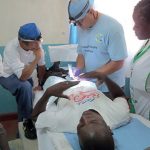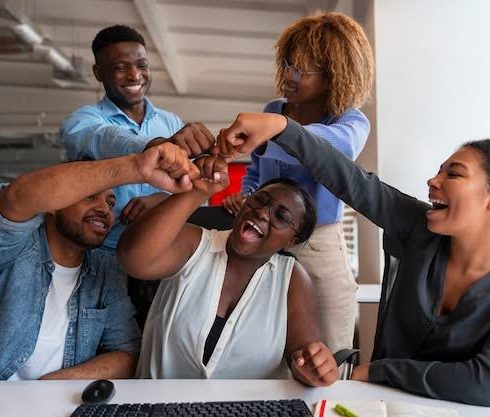In Conversations With Dr Kanu
A practice prominent in Asia and North America, information about vasectomy is as scarce in Africa as could be. With different factors culminating to ensure that Nigerians are not so welcoming of it, it could pose as one of the most effective ways to pump the brakes on an exponentially teeming population. To discuss one of the only two contraceptives available to men, Downtown’s Kehindé Fagbule sat down with Dr. Kanu Onyekachi of Marie Stopes Clinics, Nigeria.
Are you a urologist?
No, I’m not. I’m a public health specialist. However, with my organisation being the foremost providers and promoters of vasectomies in Nigeria, we have a band of doctors who received specialist training for vasectomy. A lot of that happened in Southeast Asia where vasectomies are widely accepted.
The conversations around vasectomy procedures always circle back to the definitive nature of the practice. A lot of men don’t just want to shut it for life. Have you ever had to do a reversal?
We don’t ever want to get ourselves to the point where we would begin a conversation of reversal with the client. The reason is, a vasectomy by all measures is designed to be permanent. So, before we get to the point of providing the service, we usually engage our clients in a rigorous counselling procedure to be sure that they would never get to the point where they regret and ask for a reversal. The technology for reversal is expensive and largely not available in many parts of the world. Even when the surgery for reversal is attempted, the chances of an actual reversal are very slim.
Let’s say I come to the clinic to ask to get a vasectomy, what is the first thing you’ll do?
The moment anyone makes up their mind not to have anymore children – it’s a decision lots of people make – a vasectomy itself is just one of those family planning methods available. When clients walk into my clinic and request for a vasectomy, of course the person will have to undergo some counseling. What we try to emphasize and elicit in counselling is the certainty that the individual has made up his mind. So we counsel you first on what the procedure looks like, how long it takes, if there are side effects, what are they? We have some exclusion criteria that the candidate has to take. For instance, there are clients we meet and identify as those who are at high risk of regret. Regret is one of the major side effects someone can have with their vasectomy. So we have these conversations to make sure that whatever that is pushing you to a vasectomy isn’t a temporary event. You don’t say you want to stop having kids because your last child misbehaved or your financial status won’t allow you to have another child; for these, there are short term methods to use. When we are certain that the client is not an individual who could come back with regret, we go ahead with the procedure. However, in some cases, where we’re not getting a level of certainty from the clients, we advice them to consider other methods of contraception and we can follow up with them till they are certain they want to have a vasectomy.
How long does the counselling take?
Not to put a timestamp to it, but the counselling usually takes about 20 to 30 mins depending on the client.
I noticed that there’s next to nothing on vasectomy statistics in Nigeria. How are you informed?
As you’ve rightly said, we don’t have a lot of studies that can provide us with definitive updates and trends of vasectomies in the country. There are very few people who do the surgery in Nigeria. It’s not like tubal ligation for women where you say “Okay I’m doing a caesarean section for a woman and I just do the tubes alongside”. For a vasectomy, it has to be deliberate from the beginning to the end so those who do it have gotten additional expert training outside the routine. Even the demographic health survey, the document that gives us the contraceptive prevalence and how Nigerians are taking up other forms of contraceptives did not detail on the prevalence of the vasectomy. However, a couple of studies some people have done are placing it below 0.2% use amongst men but I feel it is much lower than that. Nevertheless, in our experience as an organisation, we’ve seen more traction, people come into our clinic and get interested in vasectomies in the past three years. Between 2019 and 2020, we had close to 80% increase in people asking for the procedure and we’re also seeing a similar trend this year.
Would you give us an estimate of how many vasectomies you have carried out?
I’ve done 25 to 30 vasectomies.
Are you the one who gives out the counselling?
Our clinic has doctors and nurses who work in that department. However, before I get up to prep the operation, I do another level of counselling. It’s more like just re-echoing everything that the patient must know.It is a technical but very quick surgery and I provide this information while answering all of their questions. If I’m the one providing the service, everybody has to go through me.
What are some of the risks?
Largely, the risk involved is a psychological one: the risk of regret. Even if you get the best hands in the best environment, trying to get the vas bank to function again is a very delicate surgery, and that makes the chances of reversal very low.
Every surgery comes with a risk, however, with a vasectomy being minimally invasive, the risks are quite low. We use a local anaesthesia, meaning that the client will be awake chatting with us for the entirety of the procedure. Nonetheless, as an organisation, we emphasize infection prevention a lot to guide against any post-procedure infection and then where indicated, we might turn to antibiotics.
Now to discuss side effects; after the procedure, there might be some level of dull ache on the perennial area. However, with paracetamol and some level of rest, the person can get back to activities. Some people might experience a modular swelling within the testicular area, that’s usually the part of the vas as it’s trying to heal. These things resolve with time and don’t constitute any long-term issue for the client. Ultimately, vasectomies are safe; it doesn’t affect the man’s masculinity, the virality or the sensuality. These are some of the misconceptions people want us to confirm for them. So you’re still the man, you have sex the same way, you still ejaculate, but whatever is coming out will not be able to get a woman pregnant.
Let’s discuss post-Vasectomy recovery. What happens after the surgery?
After resting for at least a week, the client can again engage in sexual activity. However, we advice that within the first 3 months or 100 ejaculations after the surgery, whichever comes first, the client should use a condom to protect against residual sperm that may be present in the semen. Three months after surgery, we advice the client to come back for Seminal Fluid Analysis just to be certain that there are no sperm cells. After the procedure, we also notify clients of potential warning signs and red flags. If you see this or that, please come back to us just as a precautionary measure. We also advice that clients wear briefs/tight underwears for the few days after the surgery just to keep the scrotum in place and allow it to heal faster.
What do you have to say to address the myth that vasectomies are only for learned wealthy people?
On the average, we don’t know about their socioeconomic class, but from interactions, we know they are educated. We are currently in the middle of research that will give us perspectives into who our clients are, but before those results are out, we understand that our clients are educated. To fix that, we equally provide vasectomy and tubal ligation services to rural communities where people come to ask for them. The need to stop having children largely is not dependent on wealth, it is a personal realisation. Some men just come and get it done because they understand their own financial realities and their need to stop procreation. We know that information is where it all begins unfortunately, information about these services is disproportionately skewed towards the perhaps more educated high income earners. A lot hasn’t been done by the government and other medical bodies to get this information to the grassroots. This is what we try to do through outreach teams by offering the services (vasectomy, tubal ligation and other forms of contraceptive) for absolutely free to people in rural communities. We have 23 outreach teams scattered across the country providing these services. Outside that, we have our centres: in Abuja, Edo, Port Harcourt, Asaba and two in Lagos; alongside many mini-centers scattered across as well. The service could be gotten at any of these centers for as little as Fifty Thousand Naira only. Other counterpart hospitals that provide this service charge over 500-600% of what is obtainable at Marie Stopes clinics.
Dr Kanu is a clinical quality and training advisor at Marie Stopes International Organization, Nigeria.
His interests lie around strengthening the capacity health systems to expand access of Nigerians to quality reproductive health services. This includes activities in Health policy, social behavioral change communication, workforce analysis, training and other forms of technical support.
Self-identifies as a middle child between millennials and the gen Z, began writing as a 14 year-old. Born and raised in Lagos where he would go on to obtain a degree in the University of Lagos, he mainly draws inspiration from societal issues and the ills within. His "live and let live" mantra shapes his thought process as he writes about lifestyle from a place of empathy and emotional intelligence. When he is not writing, he is very invested in football and sociopolitical commentary on social media.







AGHA CHIMA UDE
4 years agoThank you Dr. Kanu for your analysis of the above.